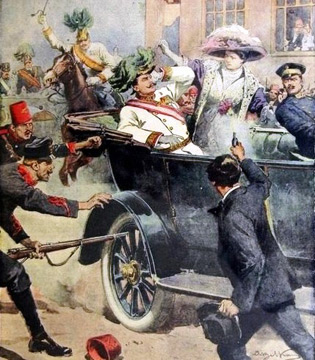Once upon a time in Sarajevo
Bitter memories after 100 years :
By Amal Hewavissenti
It was June 28, 1914. Prince France Ferdinand, the heir apparent to
the Austro-Hungarian empire was arriving, together with his wife
Princess Sophy, in the city of Sarajevo-Bosnia. Their arrival was well
anticipated by six Serb youths from a Bosnian rebellious organisation
called "Mlada Bosna" (young Bosnians).
These Serbs (mostly very young boys) were fiercely opposed to Austria
and particularly the royal representatives from Austria. They were well
armed to launch an attack on the march of vehicles in which the Austrian
royal couple were travelling.
One of the rebels hurled a bomb at the Prince's Carriage while it was
moving forward but he overshot the mark.
|

Assassination of the Archduke Ferdinand, his wife and unborn
child in Sarajevo |
The vehicles speeding along the street managed to escape unscathed
yet the bomb blast accounted for a few casualties on the street.
Meanwhile, the Prince and the Princess occupied themselves with some
duties in a hospital nearby and left the place after around two hours.
Unfortunately they happened to return through the same street where
the rebels were lurking for prey. As the unsuspecting couple were
passing the rebel group, Gravrilow Princep, a young boy fired his pistol
at the Prince vehicle. They died on the spot. Nobody had ever conceived
that this mishap caused by youthful irresponsibility would have led to a
catastrophic war in world history.
For four years (1914-1918) world war I (popularly known as the "great
war") became the biggest and perhaps the most terrible conflict between
nations that the world had ever witnessed. June 28th this year marked
the hundredth year since the outbreak of this "Great War". Many European
states and the city of Sarajeo held exclusive celebrations to mark the
hundred years' anniversary of the World War I.
Surrender
However, with the assassination of Austrian prince and princess,
Austrian government with the assistance of Germany, forcefully insisted
on the surrender of assassins.
The Austrians were under the impression that the members of Mlada
Bosna specially Crravrilov Princep were being harboured by Bosnia at the
time. The Serbs responded with a vehement denial.
The gravity of the hostile atmosphere between Austria and Bosnia
became much more intense as the Austrians began to harass average Serbs.
The officials of Austro-Hungarian empire violently manhandled Serbs
in Sarajevo in an organised manner.
The authorities of Austro -Hungarian empire in Bosnia, Croatia,
Serbia continued to harass Serbs.
In the course of this harassment, the higher officials imprisoned
more than 2000 Serbs and condemned some 400 people to capital
punishment.
To avenge the death of Prince France Ferdinand, Austro-Hungarian
empire began to set on Serbs as the deadline for the submission of the
assassins elapsed. During this decisive battle, Russia offered succour
to Serbia because Hungary was hostile to Russia. Here Germany balanced
the battling forces by coming to a tactical alliance with Austria and
Hungary. Thus began the history's most catastrophic war among the
countries in two factions in Europe. The military strategic adopted by
Germany in battling enemy forces were highly successful.
Hostile
The combination of France and Britain paralysed the progress of
German forces but they kept on invading and attacking the hostile
countries. Germany succeeded in capturing a number of enemy ships and
even caused the passenger liner "Lucitania" sink with 128 Americans
aboard.
This instantly created a powerful wave of hostility in Americans
towards Germans. And - America declared war on Germany.
Even though the world war originated and prevailed in European
countries, it broke out in other continents as well.
The World War I had exerted a tremendous impact on the human
civilisation and the damage it inflicted on people, property and culture
was perhaps incalculable.
American weapons and reinforcements for the western front arrived
from the USA and this was crucial in the final victory. In 1918 an
armistice was called but by then over seven million people had paid the
cost of war with their lives.
War inflicted irrevocable damage to the economics of the countries
which had been involved in the four years war of allied forces.
The most hazardous aspect of the World War I was the unscrupulous use
of poisonous gases and varied types of chemical weapons.
The number of soldiers who joined the war from Europe alone was 60
million. Eight million soldiers from European countries died in its wake
and same six million soldiers were left permanently handicapped.
Ill-health, lack of foodstuff, lack of immunity and malnutrition were
the inevitable by products of the World War I which bombarded nations
for four years. Production in most countries dramatically came down and
highways, railways, cultivations, hospitals and factories sustained
irrevocable damages.
The positive transformation which the war brought about in the
international political scene was the abolition of autocracy and
dictatorship.
As a direct offshoot of this political change, new states and
governments emerged and unfair practices and agreements adopted during
pre-war period came to a total abolition.
|

